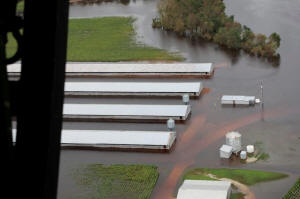|
In Florence's wake, uncertainty haunts
migrant workers
 Send a link to a friend
Send a link to a friend
 [September 18, 2018]
By Anna Mehler Paperny and Eduardo Munoz [September 18, 2018]
By Anna Mehler Paperny and Eduardo Munoz
SPIVEY'S CORNER, N.C. (Reuters) - Francisco
Javier Jaramillo and Victor Chavez should be picking sweet potatoes at a
North Carolina farm and sending much-needed money to their families in
Mexico.
Instead, Hurricane Florence has forced the migrant workers to evacuate
their farm and seek refuge at a school-turned-shelter near the tiny
hamlet of Spivey’s Corner, where they sleep in school hallways, wait and
worry.
"If the sweet potato fields are flooded, we cannot work. If we cannot
work, we will be sent home. We will have nothing," said Chavez, 39.
When Florence tore through the Carolinas last week, bringing wave after
wave of wind and rain, the storm not only disrupted a harvest but also
jeopardized its harvesters.
Known for its fields upon fields of sweet potatoes, tobacco and peanuts,
North Carolina's agricultural engine is powered by more than 83,000
migrant workers.
Many come from Mexico and other Latin American countries to toil on
restrictive contracts working fields that double as floodplains when the
weather sours.

The contracts guarantee a certain number of working hours but that can
be nullified if a farmer declares an act of god if, for example, fields
are so flooded or hurricane-battered their crop cannot be salvaged. That
would mean these workers get sent home without the hours, or money,
promised.
A spokeswoman for North Carolina’s agriculture department said there are
no estimates yet of the extent of crop damage.
At peak harvest in 2016 there were more than 83,000 migrant workers on
North Carolina farms, according to the Employment Security Commission.
Workers on an H2A visa for temporary agricultural workers are among the
most vulnerable people hit by a hurricane, according to advocates,
lawyers and outreach workers who talked with Reuters. They have the
least means to cushion the blow and the most to lose.
“H2A workers are very isolated, very vulnerable," said Lariza Garzon,
with the Episcopal Farmworkers Ministry. "They may not know their
rights.”
Lee Wicker, deputy director of the 700-farmer North Carolina Growers
Association, said maybe decades ago that might have been true but now
resources are in place to ensure workers have the supports they need.
About 20,000 of the workers come to North Carolina every year on H2A
visas, which tether them to an employer on whom they rely for housing,
transportation and, in many cases, information about the outside world,
said Caitlin Ryland, a supervising attorney with Legal Aid of North
Carolina's farmworker unit.

They are frequently housed in areas close to farmland that can be prone
to flooding, Ryland said.
[to top of second column]
|

A flooded farm is seen during a flight by a U.S. Customs and Border
Protection helicopter after the passing of Hurricane Florence, now
downgraded to a tropical depression, over central North Carolina,
U.S. September 16, 2018. U.S. Customs and Border Protection/Jaime
Rodriguez Sr./Handout via REUTERS

Wicker said that sometimes happens, but said storms like Florence
have outsize effects.
For workers like Jaramillo and Chavez, in a precarious labor
position and with limited access to outside information, leaving
camps for a few days to wait out a storm can be daunting.
Misinformation is rampant: many believe fleeing a storm can get them
deported and barred from returning.
If their employer reports them as having abandoned their job, under
the terms of the H2A visa it can start the clock ticking on having
to leave the United States, Ryland said.
Fleeing for their lives in the face of a storm does not count as
abandoning a job, she said, but many workers may not know that.
A spokeswoman for North Carolina’s Department of Labor wrote in an
email that "the Agricultural Safety and Health Bureau has not
received any complaints from migrant workers concerning unsafe
housing conditions due to the storm.”
Five migrant workers Reuters spoke with at a supermarket outside
Clinton, in Sampson County about 35 miles (56 km) east of
Fayetteville, had elected to stay in their work camps despite the
threats presented by the weather.
Explaining why he stayed, Miguel Hernandez motioned to the cement
blocks used to build his barracks in an area under a flash-flood
warning - surely they could withstand a storm, he said.

But Luis Alberto, a 25-year-old migrant worker from the Mexican
state of Nayarit, was scared for his life when he and four friends
decided to go to a shelter several miles away.
Luis Alberto, who asked not to use his last name, regularly sends
money home to support his family. What worries him now is what
happens next – if the crop is destroyed, if they cannot get the
contracted hours of work they need.
"We want to know what is going to happen to us," he said. "Can we
keep working? Will we be sent back to Mexico?"
(Reporting by Anna Mehler Paperny and Eduardo Munoz; Editing by
Frank McGurty, Jonathan Oatis and James Dalgleish)
[© 2018 Thomson Reuters. All rights
reserved.]
Copyright 2018 Reuters. All rights reserved. This material may not be published,
broadcast, rewritten or redistributed.
Thompson Reuters is solely responsible for this content. |